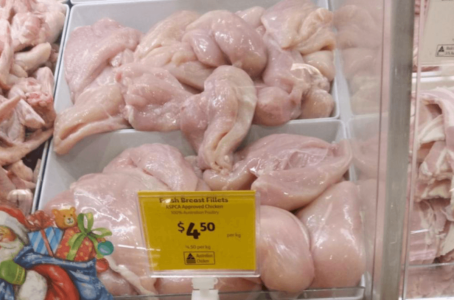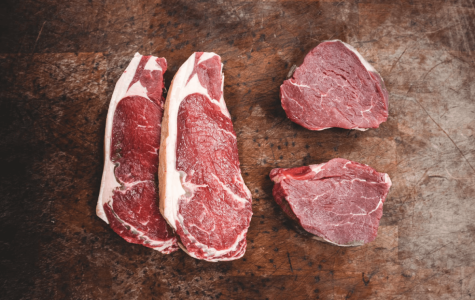'Little-known' deli policy leaves Coles shopper frustrated
- Replies 12
Members, when it comes to grocery shopping, a lot of us prefer to see our fresh foods up close before we buy them. It's only natural that we want to cautiously inspect the foods that are going to be put into our bodies, after all.
That's why being able to browse the fresh deli counters in the supermarket is such a blessing, as it allows us to select and pick out the best pieces for our family.
However, one shopper recently learned that there could be an unexpected cost to shopping for fresh items at Coles – a little-known policy regarding the expiration date of these items that left her feeling frustrated.
The Tasmanian shopper wrote on Facebook that — after buying some chicken from the deli counter at her local Coles store and, 48 hours later, finding it spoiled already — she decided to confront the deli staff.

After the woman inquired, the employee at the deli section replied, 'All the fresh chicken, seafood etc., in the deli has to be eaten within 24 hours or frozen.'
Shocked, she pointed out why there wasn't any signage noting this policy.
A Coles spokesperson later confirmed to a news source that it is recommended that the products purchased from their deli counters should be consumed within 48 hours in order to enjoy their best quality.
The customer's post was met with surprise by other shoppers, who said that this was news to them as well.
'I learned this the same way you did,' wrote one user in the comments, with another adding, 'What…'
Meanwhile, a former Coles employee argued that the policy was 'common knowledge'.
'I used to work for Coles for over 30 years, and yes, it's common knowledge that any deli line should be used within 24 hours,' she said, adding: 'Most customers were aware of this.'
This interesting revelation from Coles also led to people arguing that the grocery store should be more transparent about such policies and offer customers clearer signage regarding the potentially short lifespan of fresh food items from the deli counter.
To avoid disappointment in unfortunate incidents like the one mentioned above, we at SDC recommend that, for your fresh deli purchases, you make sure to consume them as soon as possible after buying – preferably within 48 hours, ideally 24 hours, according to other customers.

Proper meat storage
When it comes to meat, storage is an incredibly important factor, given that it's a perishable item. If stored incorrectly, not only can it become tasteless and dry, but in extreme cases, this can even lead to food poisoning and harmful bacterial infections - which no one wants to think about.
But don't worry! The good news is that we have far more control than we think when it comes to proper food storage. With just a few simple tips and tricks, you can ensure your meat stays fresh and juicy for longer, saving you money and precious ingredients.

First, you'll want to make sure the meat is stored tightly wrapped in the refrigerator. If you don't have any zip-lock bags at home, butcher's paper and styrofoam from the store packaging are also fine.
If you're planning to freeze, experts recommend storing the meat while it's still fresh, as this leaves you with a few 'use by' days on the other end to thaw and cook it.
Food Safety has provided the following recommendations for preserving food in the fridge (at 4 degrees Celsius) and freezer (at -18 degrees Celsius):
Be sure to open and rewrap it in plastic wrap or freezer paper, then seal it tightly in a zip-lock bag. If there's any meat left over and you only plan to use half, it's important to rewrap the rest for storage to avoid exposing it to too much air.
When thawing, be sure to do this carefully. Rapid freezing and gentle thawing is the best way to avoid any loss of quality. You'll also want to avoid refreezing meat, as this could affect the quality of both the texture and the flavour.
Finally, trust your senses when it comes to handling fresh meat - does it have a good, bright colour, is it moist and fresh to the touch, and does it have a strong odour?
If there's even a hint of something suspicious, throw it away and stick to the 'use by' date on the label.

As you can see, there's no need to waste money (or precious ingredients) unnecessarily because of ill-advised food storage. When done properly, you can keep your meats juicy and full of flavour for quite some time.
Members, we hope these tips help you navigate meat-buying like a pro! Got any secrets for keeping your fresh meat in tip-top shape? Share your thoughts and advice in the comments below - we'd love to hear from you!
That's why being able to browse the fresh deli counters in the supermarket is such a blessing, as it allows us to select and pick out the best pieces for our family.
However, one shopper recently learned that there could be an unexpected cost to shopping for fresh items at Coles – a little-known policy regarding the expiration date of these items that left her feeling frustrated.
The Tasmanian shopper wrote on Facebook that — after buying some chicken from the deli counter at her local Coles store and, 48 hours later, finding it spoiled already — she decided to confront the deli staff.

Fresh items purchased from the Coles' seafood, chicken and deli counter must be consumed within 24 hours of purchase. Credit: Facebook.
After the woman inquired, the employee at the deli section replied, 'All the fresh chicken, seafood etc., in the deli has to be eaten within 24 hours or frozen.'
Shocked, she pointed out why there wasn't any signage noting this policy.
A Coles spokesperson later confirmed to a news source that it is recommended that the products purchased from their deli counters should be consumed within 48 hours in order to enjoy their best quality.
The customer's post was met with surprise by other shoppers, who said that this was news to them as well.
'I learned this the same way you did,' wrote one user in the comments, with another adding, 'What…'
Meanwhile, a former Coles employee argued that the policy was 'common knowledge'.
'I used to work for Coles for over 30 years, and yes, it's common knowledge that any deli line should be used within 24 hours,' she said, adding: 'Most customers were aware of this.'
This interesting revelation from Coles also led to people arguing that the grocery store should be more transparent about such policies and offer customers clearer signage regarding the potentially short lifespan of fresh food items from the deli counter.
To avoid disappointment in unfortunate incidents like the one mentioned above, we at SDC recommend that, for your fresh deli purchases, you make sure to consume them as soon as possible after buying – preferably within 48 hours, ideally 24 hours, according to other customers.
Key Takeaways
- A Coles shopper in Tasmania was frustrated to discover that items purchased from the seafood, chicken, and deli counters in their local store must be consumed within 24 hours.
- Many customers did not know this policy and argued that Coles should be more upfront with their policy and offer more signage.
When it comes to meat, storage is an incredibly important factor, given that it's a perishable item. If stored incorrectly, not only can it become tasteless and dry, but in extreme cases, this can even lead to food poisoning and harmful bacterial infections - which no one wants to think about.
But don't worry! The good news is that we have far more control than we think when it comes to proper food storage. With just a few simple tips and tricks, you can ensure your meat stays fresh and juicy for longer, saving you money and precious ingredients.

It's best to eat fresh and raw meat as soon as possible, but with proper storage, you can make sure they stay fresh for longer. Credit: Unsplash/Victoria Shes.
First, you'll want to make sure the meat is stored tightly wrapped in the refrigerator. If you don't have any zip-lock bags at home, butcher's paper and styrofoam from the store packaging are also fine.
If you're planning to freeze, experts recommend storing the meat while it's still fresh, as this leaves you with a few 'use by' days on the other end to thaw and cook it.
Food Safety has provided the following recommendations for preserving food in the fridge (at 4 degrees Celsius) and freezer (at -18 degrees Celsius):
- Bacon - up to 1 week in the fridge and up to 1 month in the freezer
- Sausage, raw (from chicken, turkey, pork, or beef) - up to 1-2 days in the fridge and up to 1-2 months in the freezer
- Sausage, fully cooked (from chicken, turkey, pork, or beef) - up to 1 week in the fridge and up to 1-2 months in the freezer
- Hamburger, ground beef, turkey, chicken, other poultry, veal, pork, lamb, and mixtures of them - up to 1-2 days in the fridge and up to 3-4months in the freezer
- Fresh beef, veal, lamb, and pork (steaks, chops, or roasts) - up to 3-5 days in the fridge and up to 4-12 months in the freezer
- Fresh poultry (chicken or turkey) - up to 1-2 days in the fridge and up to 9 months in the freezer
Be sure to open and rewrap it in plastic wrap or freezer paper, then seal it tightly in a zip-lock bag. If there's any meat left over and you only plan to use half, it's important to rewrap the rest for storage to avoid exposing it to too much air.
When thawing, be sure to do this carefully. Rapid freezing and gentle thawing is the best way to avoid any loss of quality. You'll also want to avoid refreezing meat, as this could affect the quality of both the texture and the flavour.
Finally, trust your senses when it comes to handling fresh meat - does it have a good, bright colour, is it moist and fresh to the touch, and does it have a strong odour?
If there's even a hint of something suspicious, throw it away and stick to the 'use by' date on the label.

The less time meat spends in the freezer, the better it will keep its quality and taste. Credit: Unsplash/Kyle Mackie.
As you can see, there's no need to waste money (or precious ingredients) unnecessarily because of ill-advised food storage. When done properly, you can keep your meats juicy and full of flavour for quite some time.
Members, we hope these tips help you navigate meat-buying like a pro! Got any secrets for keeping your fresh meat in tip-top shape? Share your thoughts and advice in the comments below - we'd love to hear from you!








